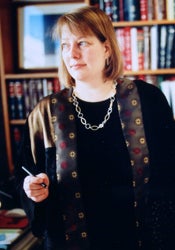Harvard Law School Professor Carol Steiker ’86 has been appointed by the Massachusetts Supreme Judicial Court to a three-year term on the Committee for Public Counsel Services (CPCS). The 15-member committee oversees the statewide provision of public defense services and other legal representation for indigent persons in criminal and civil court cases and proceedings in Massachusetts.
Said Steiker: “I am very pleased to have this opportunity to draw on my own background as a former public defender and a scholar of the criminal justice system to contribute to the important task of ensuring the quality of legal representation provided to indigent people across the state.”
Steiker is well known for her criminal law scholarship, particularly for her research and writing regarding the death penalty. A study by Steiker and her brother, Professor Jordan Steiker of the University of Texas Law School, led the American Law Institute (ALI) to vote to withdraw the capital punishment section of its Model Penal Code.
The study, which was requested by the ALI, examined the effectiveness of the Model Penal Code’s death penalty provisions, which were enacted in 1962 and were designed to make the administration of the death penalty less arbitrary. The Model Penal Code provisions were cited by the U.S. Supreme Court in 1976 when it determined that the death penalty could be administered in a constitutional way.
In addition to her scholarly work, Steiker has worked on numerous pro bono litigation projects on behalf of indigent criminal defendants. She has also served as a consultant and an expert witness on issues of criminal justice for non-profit organizations and has testified before Congress and the Massachusetts legislature. In 2008, she received the Hugo A. Bedau Award from Massachusetts Citizens Against the Death Penalty.
Steiker joined the HLS faculty in 1992 as an assistant professor of law, and was associate dean from 1998 until 2001. She was named the Howard and Katherine Abel Professor of Law at HLS in 2007. She is also a faculty associate of the Harvard University Edmond J. Safra Foundation Center for Ethics and a special adviser for public service.
